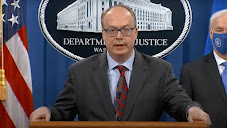Jeffrey Clark’s Lawyers Demand Fani Willis’ ‘Grotesque Abuse Of Prosecutorial Power’ Be Dismissed
BY: JORDAN BOYD NOVEMBER 01, 2023 The Federalist“There is zero allegation or evidence that Mr. Clark directed any purposeful activity into the State of Georgia,” the lawyers wrote. “The inquiry ought to end there. But it gets worse: there are zero specific allegations or evidence that Mr. Clark agreed with any resident defendant to do anything. An arm-waving general and conclusory allegation that all defendants conspired to unlawfully overturn the 2020 election is not sufficient to meet the threshold due process requirements for establishing personal jurisdiction.”
Willis’ attempt to “punish a thought crime with the full penal and coercive power of the State” by indicting Clark, former President Donald Trump, and 17 others, Clark’s lawyers wrote, has forced the U.S. into a constitutional crisis unlike anything this nation has ever seen before.
“So here we are: this District Attorney seeks to imprison the leading presidential candidate of her opposite political party, to the acclaim of those baying for his destruction. She has dragged all of us not just into the outskirts of dangerous constitutional territory but into the maelstrom of a full-blown constitutional collapse,” the special plea states.
Clark’s association with former President Donald Trump, who nominated Clark first as assistant attorney general of the Environment and Natural Resources Division and later as acting assistant attorney general for the Civil Division, made him one of the 19 “co-conspirator” targets in Democrats’ wide-ranging election indictment in Fulton County, Georgia.
“The Indictment rests on a dogmatic premise that the election of President Biden was free of material irregularity and that any thought, expression, or conduct of the Defendants to the contrary was necessarily wrongful and criminal, and thus constituted a massive (but on its face preposterous) Georgia RICO conspiracy,” the attorneys wrote.
Clark specifically came under scrutiny for drafting a letter to Georgia officials shortly after the 2020 election that claimed the Department of Justice had “identified significant concerns that may have impacted the outcome of the election in multiple States, including the State of Georgia.” Clark did not send the letter after his DOJ superiors claimed the Civil Division should play no role in election issues.
In a personal affidavit filed on the same day as the special plea, Clark confirmed that he does not live in Georgia, never sent a letter to Georgia, and never visited the state during his tenure in the Trump administration. He merely made a legal recommendation involving the state.
For the crime of questioning “the Democrat Party’s prevailing creed that there were absolutely no significant or potentially outcome determinative problems in the 2020 election in Georgia or in Fulton County in particular,” Willis charged Clark with multiple crimes such as “alleged postelection interference with the 2020 presidential election in Georgia” even though his letter was never delivered.
Clark found allies in several people, including former Attorney General Ed Meese, who, in a 19-page affidavit, argued that the letter “fit squarely within the privileges discussed above as recognized by Presidents, the Congress, and various courts throughout our history.”
“It also fits squarely within the protections of the Opinion Clause of the Constitution,” Meese wrote, noting that Clark’s case should be moved to federal court.
But even Meese’s word wasn’t enough to call off the “witch hunt.”
Jordan Boyd is a staff writer at The Federalist and co-producer of The Federalist Radio Hour.





No comments:
Post a Comment